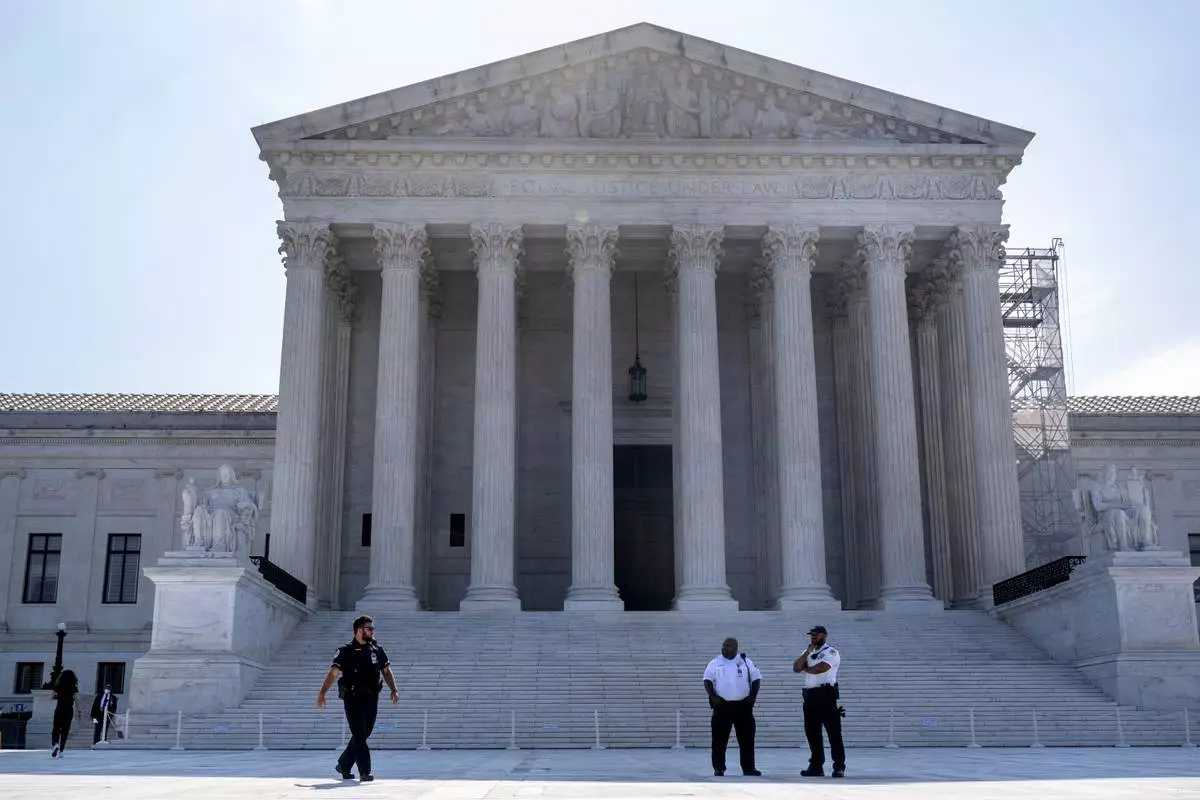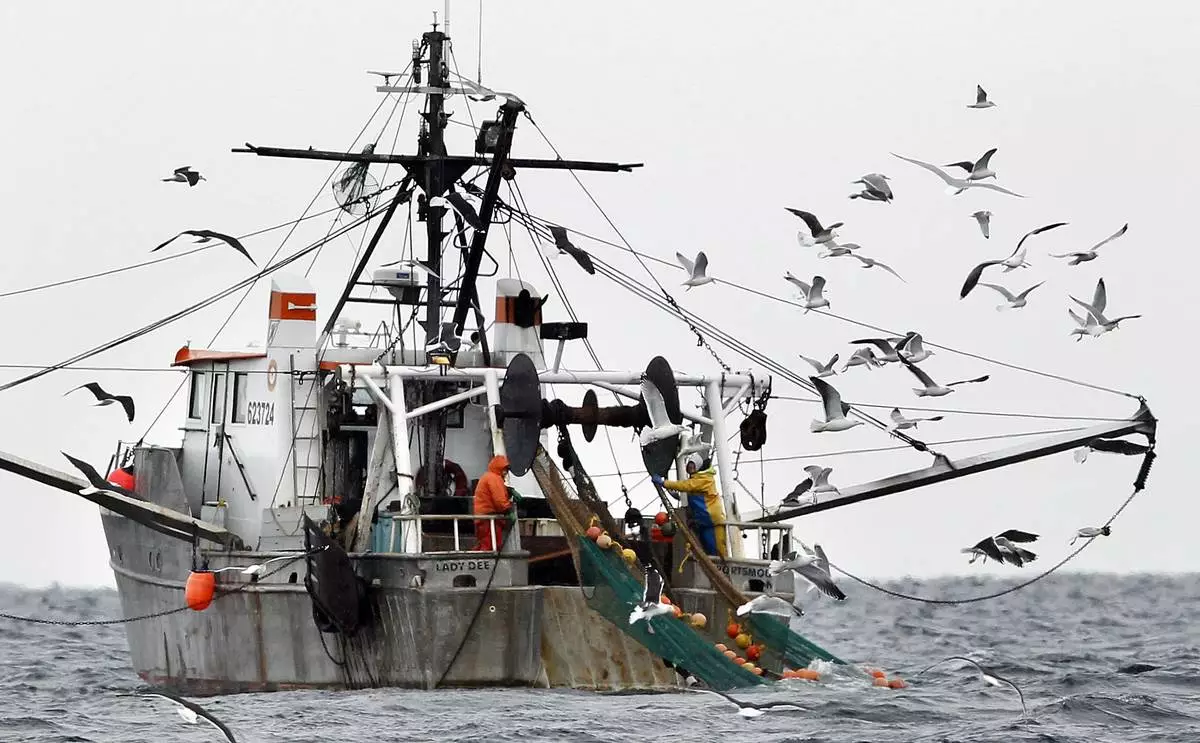DETROIT (AP) — Pro Football Hall of Fame running back Barry Sanders says he “experienced a health scare related to my heart” last weekend.
“It was unexpected and served as a reminder of the importance of staying vigilant about our physical well-being, even when we are feeling fine,” the former Detroit Lions great said in a statement posted Friday on social media.
The Lions issued their own social media post saying, “Get well soon Barry.”
“I am grateful for the amazing doctors, nurses and other healthcare professionals for providing me with needed care,” Sanders said. “My family and I are thankful for your prayers and support during this time. Per my doctors’ recommendation, I am taking this opportunity to prioritize my health and well-being. I appreciate your understanding and continued support.”
Sanders, who turns 56 next month, was a six-time All-Pro while starring for the Lions from 1989-98 before his sudden retirement. He rushed for 15,269 yards and 99 touchdowns in his career, including 2,053 yards in his MVP season of 1997.
He was inducted into the Hall of Fame in 2004.
Sanders spent his entire career with the Lions, who selected him with the third overall pick in the 1989 NFL draft after his Heisman Trophy-winning season with Oklahoma State.
AP NFL: https://apnews.com/hub/nfl

FILE - Former Detroit Lions running back Barry Sanders stands on the field before the NFC Championship NFL football game between the San Francisco 49ers and the Lions in Santa Clara, Calif., Jan. 28, 2024. Sanders says he “experienced a health scare related to my heart” last weekend. “It was unexpected and served as a reminder of the importance of staying vigilant about our physical well-being, even when we are feeling fine,” Sanders said in a statement posted Friday, June 21, on social media. (AP Photo/Scot Tucker, File)
WASHINGTON (AP) — Executive branch agencies will likely have more difficulty regulating the environment, public health, workplace safety and other issues under a far-reaching decision by the Supreme Court.
The court's 6-3 ruling on Friday overturned a 1984 decision colloquially known as Chevron that has instructed lower courts to defer to federal agencies when laws passed by Congress are not crystal clear.
The 40-year-old decision has been the basis for upholding thousands of regulations by dozens of federal agencies, but has long been a target of conservatives and business groups who argue that it grants too much power to the executive branch, or what some critics call the administrative state.
The Biden administration has defended the law, warning that overturning so-called Chevron deference would be destabilizing and could bring a “convulsive shock” to the nation's legal system.
Chief Justice John Roberts, writing for the court, said federal judges “must exercise their independent judgment in deciding whether an agency has acted within its statutory authority.”
The ruling does not call into question prior cases that relied on the Chevron doctrine, Roberts wrote.
Here is a look at the court's decision and the implications for government regulations going forward.
Atlantic herring fishermen sued over federal rules requiring them to pay for independent observers to monitor their catch. The fishermen argued that the 1976 Magnuson-Stevens Fishery Conservation and Management Act did not authorize officials to create industry-funded monitoring requirements and that the National Marine Fisheries Service failed to follow proper rulemaking procedure.
In two related cases, the fishermen asked the court to overturn the 40-year-old Chevron doctrine, which stems from a unanimous Supreme Court case involving the energy giant in a dispute over the Clean Air Act. That ruling said judges should defer to the executive branch when laws passed by Congress are ambiguous.
In that case, the court upheld an action by the Environmental Protection Agency under then-President Ronald Reagan.
In the decades following the ruling, Chevron has been a bedrock of modern administrative law, requiring judges to defer to agencies’ reasonable interpretations of congressional statutes.
But the current high court, with a 6-3 conservative majority has been increasingly skeptical of the powers of federal agencies. Justices Brett Kavanaugh, Clarence Thomas, Samuel Alito and Neil Gorsuch have questioned the Chevron decision. Ironically, it was Gorsuch's mother, former EPA Administrator Anne Gorsuch, who made the decision that the Supreme Court upheld in 1984.
With a closely divided Congress, presidential administrations have increasingly turned to federal regulation to implement policy changes. Federal rules impact virtually every aspect of everyday life, from the food we eat and the cars we drive to the air we breathe and homes we live in.
President Joe Biden's administration, for example, has issued a host of new regulations on the environment and other priorities, including restrictions on emissions from power plants and vehicle tailpipes, and rules on student loan forgiveness, overtime pay and affordable housing.
Those actions and others could be opened up to legal challenges if judges are allowed to discount or disregard the expertise of the executive-branch agencies that put them into place.
With billions of dollars potentially at stake, groups representing the gun industry and other businesses such as tobacco, agriculture, timber and homebuilding, were among those pressing the justices to overturn the Chevron doctrine and weaken government regulation.
The U.S. Chamber of Commerce filed an amicus brief last year on behalf of business groups arguing that modern application of Chevron has “fostered aggrandizement'' of the executive branch at the expense of Congress and the courts.
David Doniger, a lawyer and longtime Natural Resources Defense Council official who argued the original Chevron case in 1984, said he feared that a ruling to overturn the doctrine could “free judges to be radical activists” who could “effectively rewrite our laws and block the protections they are supposed to provide."
“The net effect will be to weaken our government’s ability to meet the real problems the world is throwing at us — big things like COVID and climate change,″ Doniger said.
“This case was never just about fish,'' said Meredith Moore of the environmental group Ocean Conservancy. Instead, businesses and other interest groups used the herring fishery “to attack the foundations of the public agencies that serve the American public and conserve our natural resources,'' she said.
The court ruling will likely open the floodgates to litigation that could erode critical protections for people and the environment, Moore and other advocates said.
"For more than 30 years, fishery observers have successfully helped ensure that our oceans are responsibly managed so that fishing can continue in the future,'' said Dustin Cranor of Oceana, another conservation group.
He called the case "just the latest example of the far right trying to undermine the federal government’s ability to protect our oceans, waters, public lands, clean air and health.''
West Virginia Attorney General Patrick Morrisey called the decision a fitting follow-up to a 2022 decision — in a case he brought — that limits the EPA’s ability to control greenhouse gas emissions from power plants. The court held that Congress must speak with specificity when it wants to give an agency authority to regulate on an issue of major national significance.
Morrisey, now the GOP nominee for governor, called Chevron “a misguided doctrine under which courts defer to legally dubious interpretations of statutes put out by federal administrative agencies.”
The Supreme Court ruling will almost certainly shift power away from the executive branch and Congress and toward courts, said Craig Green, a professor at Temple University’s Beasley School of Law.
“Federal judges will now have the first and final word about what statutes mean,″ he said. “That’s a big shift in power.″
In what some observers see as a historic irony, many conservatives who now attack Chevron once celebrated it. The late Supreme Court Justice Antonin Scalia was among those who hailed the original ruling as a way to rein in liberal laws.
"Conservatives believed in this rule until they didn't,'' Green said in an interview.
In recent years, conservatives have focused on "deconstruction of the administrative state,'' even if the result lessens the ability of a conservative president to impose his beliefs on government agencies.
"If you weaken the federal government, you get less government,'' Green said — an outcome that many conservatives, including those who back former President Donald Trump, welcome.
The ruling will likely “gum up the works for federal agencies and make it even harder for them to address big problems. Which is precisely what the critics of Chevron want," said Jody Freeman, director of the environmental and energy law program at Harvard Law School.

The Supreme Court building is seen on Friday, June 28, 2024, in Washington. (AP Photo/Mark Schiefelbein)

FILE- Gulls follow a commercial fishing boat as crewmen haul in their catch in the Gulf of Maine, in this Jan. 17, 2012 file photo. TExecutive branch agencies will likely have more difficulty regulating the environment, public health, workplace safety and other issues under a far-reaching decision by the Supreme Court. The court's 6-3 ruling on Friday overturned a 1984 decision colloquially known as Chevron that has instructed lower courts to defer to federal agencies when laws passed by Congress are not crystal clear. (AP Photo/Robert F. Bukaty, File)












